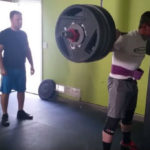
“Strength training is for men.”
“Why don’t you play volleyball instead?”
“You’re going to look manly…”
All remnant phrases of a time that has—thank goodness—gone and went.
Attitudes towards strength are changing as old assumptions have quickly proven to be nothing but just that—assumptions.
In the well-placed words of veteran journalist and Express News columnist Roy Bragg, assertions will often get you in trouble:
“Camel cigarettes will “give your throat a vacation.” The Segway will change how Americans live. Johnny Manziel will revolutionize and dominate the NFL.
All of those assertions — from a 1950s magazine ad, Jeff Bezos and me, respectively — have turned out to be wrong, wrong and remarkably wrong.”
Fortunately, more and more women are starting to realize this fact. In just the past few years, the population of female powerlifters has doubled from 3,000 to 6,000 competitors. Even more remarkable, one third of all powerlifters in the USA are now women.
But it’s not without cause: more and more women are starting to learn of the amazing, empowering benefits of strength training. This shift in zeitgeist is no doubt the result of a much-needed positive change throughout the lifting community that now promotes strength for more than just “macho” men.
Cynthia Leu is one such lifter who has helped to pave the way for others like her. Troubled with bulimia and body acceptance issues, she turned to the iron sport and signed up for her first meet:
“In a sense, finding powerlifting and getting into that kind of saved my life. It wasn’t until I signed up for my first powerlifting meet that I was able to break the unhealthy cycle that I was in due to the fact that I had to keep food in my body in order to lift heavy weight in the gym. It was a refreshing change to start viewing food as fuel.”
Beyond a positive mental shift, the sport also provides a host of benefits for women and girls.
- Most women have ample flexibility but lack adequate strength. With just three lifts (squat, bench press, and deadlift) powerlifting helps to build a strong body from head to toe.
- It ignites your competitive spirit—with yourself. Working to be the strongest version you can be keeps the focus where it should be instead of worrying about comparing yourself to others.
- Numbers and progress are empowering. Marshall Roy, a certified trainer and Philadelphia gym owner, says that many of the females he works with come to him disheartened from months of a general fitness plan with no quantifiable progress. Powerlifting is a “number” sport and provides instant feedback each and every workout.
- It disrupts the “thin body” falsehood and helps build an admirable, awesome physique. The resulting increase in metabolism also makes burning fat easier, if that is your goal—and there is nothing wrong if it isn’t. Becci Holcomb is an absolute inspiration and amazing role model and shows that the only thing that truly matters is that you love yourself in your own skin.
Best of all, it is easy to get started; no special requirements are needed other than a gym membership and the willingness to try something new.
Learning How to Become a Female Powerlifter Has Never Been Easier
Knowing how to get started when you are a complete beginner can seem like a daunting task. With the right information, however, it doesn’t have to be!
- Pick a powerlifting program that is right for you. If you’re just starting out, a simple 3-day per week plan is perfect and helps you to test the waters, start slow, perfect your form, and stay safe.
- Consider signing up for a female-only powerlifting competition. The Iron Maidens Raw Open and Queens of the Iron are both excellent choices and provide a supportive environment of camaraderie.
- Eat to fuel your body. Lifting heavy burns a lot of calories; make sure to eat plenty of food to recover from session to session. This does not mean you have to gain weight if you do not want to. Regardless of your diet, tracking calories and making the adjustments to add or subtract where needed is fundamental to weight management.
- Find a training partner. Working out with a buddy makes everything more enjoyable. Have any of your friends considered trying strength training? More likely than not—they have!
There are also many supportive online communities for female lifters specifically. Having a huge group of people rooting for you can make all the difference, especially when you are starting out.
Women have begun to find a home with powerlifting, and one can only hope the trend continues as more find that strength was never meant to be “men only”—a change that hopefully sparks another empowering question: “What else do I think I can’t do that I truly can?”
Related Article:
